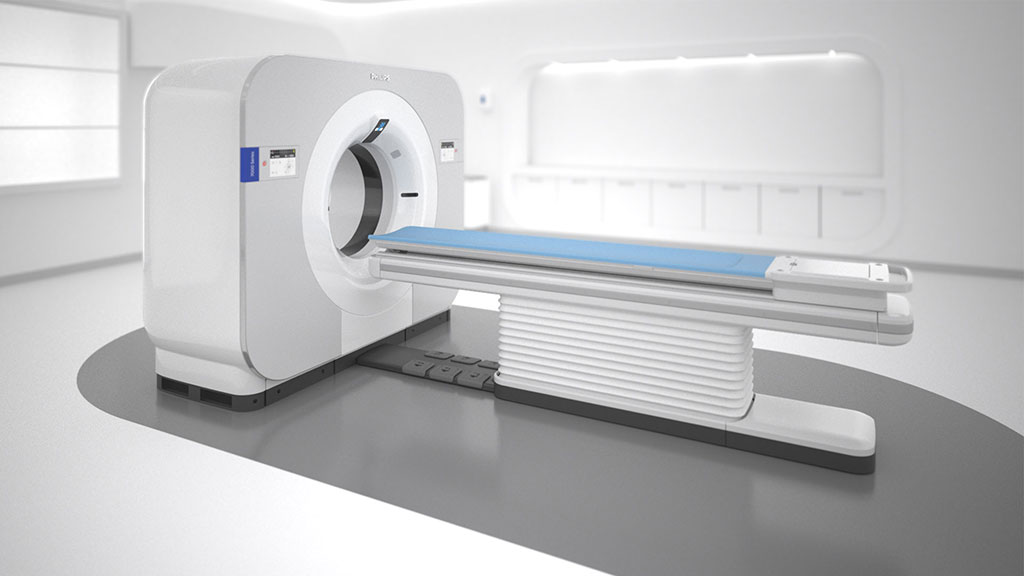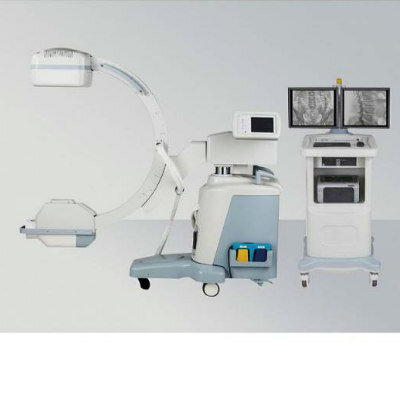Philips Launches New Intelligent CT System that Provides Spectral Information for Every Patient and Every Scan
|
By MedImaging International staff writers Posted on 21 May 2021 |

Image: Spectral CT 7500 (Photo courtesy of Royal Philips)
Royal Philips (Amsterdam, The Netherlands) has launched its newest solution for precision diagnosis with the global introduction of its spectral detector-based Spectral Computed Tomography (CT) 7500.
The latest intelligent system delivers high quality spectral images for every patient on every scan 100% of the time to help improve disease characterization, and reduce rescans and follow-ups, all at the same dose levels as conventional scans. The time-saving spectral workflow is fully integrated, enabling the technologist to get the patient on and off the table quickly – spectral chest scans and head scans take less than one second, and a full upper body spectral scan can be completed in less than two seconds – while still delivering high quality imaging that allows the physician to rapidly deliver a confident diagnosis and effective treatment plan for each patient.
The new Spectral CT 7500 was designed for first-time-right diagnosis and has demonstrated a 34% reduction in time to diagnosis, a 25% reduction in repeat scans and a 30% reduction in follow-up scans. Spectral CT has demonstrated a higher sensitivity in detecting malignant findings and has improved readings of incidental findings. With Philips spectral detector CT, photons add more value by helping salvage sub-optimal injection scans without the need to re-scan the patients, shortening the time to diagnosis.
Spectral CT 7500 expands on Philips proven spectral-detector benefits to now include additional patient populations that were not previously served. The spectral insights are available for all patients, from pediatric to bariatric, and for any clinical indication, including challenging cardiac scans with high and irregular heart rates, without compromising image quality, dose or workflow. The spectral workflow enables radiologists to optimize reading with rich spectral results and AI-based smart tools available in any reading environment with Spectral Magic Glass on PACS.
“With such great human and financial costs due to misdiagnosis, Spectral CT 7500 sets a new standard of care where image quality, dose and workflow come together to deliver valuable clinical insights. This latest intelligent system helps to bring clarity to defining moments in healthcare by delivering on certainty, simplicity and reliability in every clinical area from cardiac care, to emergency radiology, diagnostic oncology, intervention and radiation oncology,” said Kees Wesdorp, Chief Business Leader of Precision Diagnosis at Philips. “Our detector-based spectral technology ensures spectral data is always available and is seamlessly integrated into current workflows, meaning scans are fast, and clinicians are able to send patients the right treatment pathway with a more confident diagnosis.”
The latest intelligent system delivers high quality spectral images for every patient on every scan 100% of the time to help improve disease characterization, and reduce rescans and follow-ups, all at the same dose levels as conventional scans. The time-saving spectral workflow is fully integrated, enabling the technologist to get the patient on and off the table quickly – spectral chest scans and head scans take less than one second, and a full upper body spectral scan can be completed in less than two seconds – while still delivering high quality imaging that allows the physician to rapidly deliver a confident diagnosis and effective treatment plan for each patient.
The new Spectral CT 7500 was designed for first-time-right diagnosis and has demonstrated a 34% reduction in time to diagnosis, a 25% reduction in repeat scans and a 30% reduction in follow-up scans. Spectral CT has demonstrated a higher sensitivity in detecting malignant findings and has improved readings of incidental findings. With Philips spectral detector CT, photons add more value by helping salvage sub-optimal injection scans without the need to re-scan the patients, shortening the time to diagnosis.
Spectral CT 7500 expands on Philips proven spectral-detector benefits to now include additional patient populations that were not previously served. The spectral insights are available for all patients, from pediatric to bariatric, and for any clinical indication, including challenging cardiac scans with high and irregular heart rates, without compromising image quality, dose or workflow. The spectral workflow enables radiologists to optimize reading with rich spectral results and AI-based smart tools available in any reading environment with Spectral Magic Glass on PACS.
“With such great human and financial costs due to misdiagnosis, Spectral CT 7500 sets a new standard of care where image quality, dose and workflow come together to deliver valuable clinical insights. This latest intelligent system helps to bring clarity to defining moments in healthcare by delivering on certainty, simplicity and reliability in every clinical area from cardiac care, to emergency radiology, diagnostic oncology, intervention and radiation oncology,” said Kees Wesdorp, Chief Business Leader of Precision Diagnosis at Philips. “Our detector-based spectral technology ensures spectral data is always available and is seamlessly integrated into current workflows, meaning scans are fast, and clinicians are able to send patients the right treatment pathway with a more confident diagnosis.”
Latest Radiography News
- Novel Breast Imaging System Proves As Effective As Mammography
- AI Assistance Improves Breast-Cancer Screening by Reducing False Positives
- AI Could Boost Clinical Adoption of Chest DDR
- 3D Mammography Almost Halves Breast Cancer Incidence between Two Screening Tests
- AI Model Predicts 5-Year Breast Cancer Risk from Mammograms
- Deep Learning Framework Detects Fractures in X-Ray Images With 99% Accuracy
- Direct AI-Based Medical X-Ray Imaging System a Paradigm-Shift from Conventional DR and CT
- Chest X-Ray AI Solution Automatically Identifies, Categorizes and Highlights Suspicious Areas
- AI Diagnoses Wrist Fractures As Well As Radiologists
- Annual Mammography Beginning At 40 Cuts Breast Cancer Mortality By 42%
- 3D Human GPS Powered By Light Paves Way for Radiation-Free Minimally-Invasive Surgery
- Novel AI Technology to Revolutionize Cancer Detection in Dense Breasts
- AI Solution Provides Radiologists with 'Second Pair' Of Eyes to Detect Breast Cancers
- AI Helps General Radiologists Achieve Specialist-Level Performance in Interpreting Mammograms
- Novel Imaging Technique Could Transform Breast Cancer Detection
- Computer Program Combines AI and Heat-Imaging Technology for Early Breast Cancer Detection
Channels
MRI
view channel
Diamond Dust Could Offer New Contrast Agent Option for Future MRI Scans
Gadolinium, a heavy metal used for over three decades as a contrast agent in medical imaging, enhances the clarity of MRI scans by highlighting affected areas. Despite its utility, gadolinium not only... Read more.jpg)
Combining MRI with PSA Testing Improves Clinical Outcomes for Prostate Cancer Patients
Prostate cancer is a leading health concern globally, consistently being one of the most common types of cancer among men and a major cause of cancer-related deaths. In the United States, it is the most... Read more
PET/MRI Improves Diagnostic Accuracy for Prostate Cancer Patients
The Prostate Imaging Reporting and Data System (PI-RADS) is a five-point scale to assess potential prostate cancer in MR images. PI-RADS category 3 which offers an unclear suggestion of clinically significant... Read more
Next Generation MR-Guided Focused Ultrasound Ushers In Future of Incisionless Neurosurgery
Essential tremor, often called familial, idiopathic, or benign tremor, leads to uncontrollable shaking that significantly affects a person’s life. When traditional medications do not alleviate symptoms,... Read moreUltrasound
view channel.jpg)
Groundbreaking Technology Enables Precise, Automatic Measurement of Peripheral Blood Vessels
The current standard of care of using angiographic information is often inadequate for accurately assessing vessel size in the estimated 20 million people in the U.S. who suffer from peripheral vascular disease.... Read more
Deep Learning Advances Super-Resolution Ultrasound Imaging
Ultrasound localization microscopy (ULM) is an advanced imaging technique that offers high-resolution visualization of microvascular structures. It employs microbubbles, FDA-approved contrast agents, injected... Read more
Novel Ultrasound-Launched Targeted Nanoparticle Eliminates Biofilm and Bacterial Infection
Biofilms, formed by bacteria aggregating into dense communities for protection against harsh environmental conditions, are a significant contributor to various infectious diseases. Biofilms frequently... Read moreNuclear Medicine
view channel
New Imaging Technique Monitors Inflammation Disorders without Radiation Exposure
Imaging inflammation using traditional radiological techniques presents significant challenges, including radiation exposure, poor image quality, high costs, and invasive procedures. Now, new contrast... Read more
New SPECT/CT Technique Could Change Imaging Practices and Increase Patient Access
The development of lead-212 (212Pb)-PSMA–based targeted alpha therapy (TAT) is garnering significant interest in treating patients with metastatic castration-resistant prostate cancer. The imaging of 212Pb,... Read moreNew Radiotheranostic System Detects and Treats Ovarian Cancer Noninvasively
Ovarian cancer is the most lethal gynecological cancer, with less than a 30% five-year survival rate for those diagnosed in late stages. Despite surgery and platinum-based chemotherapy being the standard... Read more
AI System Automatically and Reliably Detects Cardiac Amyloidosis Using Scintigraphy Imaging
Cardiac amyloidosis, a condition characterized by the buildup of abnormal protein deposits (amyloids) in the heart muscle, severely affects heart function and can lead to heart failure or death without... Read moreGeneral/Advanced Imaging
view channel
PET Scans Reveal Hidden Inflammation in Multiple Sclerosis Patients
A key challenge for clinicians treating patients with multiple sclerosis (MS) is that after a certain amount of time, they continue to worsen even though their MRIs show no change. A new study has now... Read more
Artificial Intelligence Evaluates Cardiovascular Risk from CT Scans
Chest computed tomography (CT) is a common diagnostic tool, with approximately 15 million scans conducted each year in the United States, though many are underutilized or not fully explored.... Read more
New AI Method Captures Uncertainty in Medical Images
In the field of biomedicine, segmentation is the process of annotating pixels from an important structure in medical images, such as organs or cells. Artificial Intelligence (AI) models are utilized to... Read more.jpg)
CT Coronary Angiography Reduces Need for Invasive Tests to Diagnose Coronary Artery Disease
Coronary artery disease (CAD), one of the leading causes of death worldwide, involves the narrowing of coronary arteries due to atherosclerosis, resulting in insufficient blood flow to the heart muscle.... Read moreImaging IT
view channel
New Google Cloud Medical Imaging Suite Makes Imaging Healthcare Data More Accessible
Medical imaging is a critical tool used to diagnose patients, and there are billions of medical images scanned globally each year. Imaging data accounts for about 90% of all healthcare data1 and, until... Read more
Global AI in Medical Diagnostics Market to Be Driven by Demand for Image Recognition in Radiology
The global artificial intelligence (AI) in medical diagnostics market is expanding with early disease detection being one of its key applications and image recognition becoming a compelling consumer proposition... Read moreIndustry News
view channel
Bayer and Google Partner on New AI Product for Radiologists
Medical imaging data comprises around 90% of all healthcare data, and it is a highly complex and rich clinical data modality and serves as a vital tool for diagnosing patients. Each year, billions of medical... Read more
















